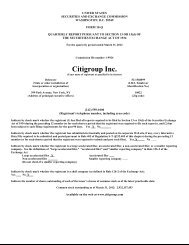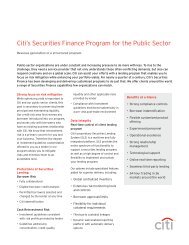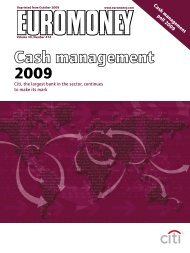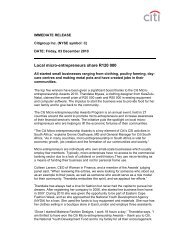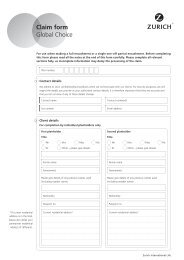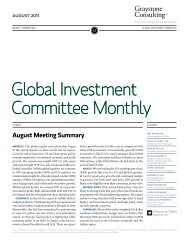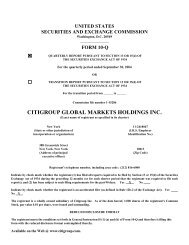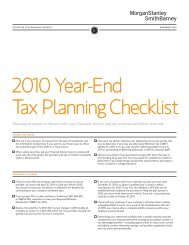Citigroup Inc.
Citigroup Inc.
Citigroup Inc.
You also want an ePaper? Increase the reach of your titles
YUMPU automatically turns print PDFs into web optimized ePapers that Google loves.
Contributions<strong>Citigroup</strong>’s pension funding policy for U.S. plans and non-U.S. plans isgenerally to fund to applicable minimum funding requirements ratherthan to the amounts of accumulated benefit obligations. For the U.S. plans,the Company may increase its contributions above the minimum requiredcontribution under ERISA, if appropriate to its tax and cash position andthe plans’ funded position. For the U.S. pension plans, at December 31,2010, there were no minimum required cash contributions. During 2010, adiscretionary cash contribution of $995 million was made to the plan. Forthe non-U.S. pension plans, discretionary cash contributions in 2011 areanticipated to be approximately $196 million. In addition, the Companyexpects to contribute $41 million of benefits to be paid directly by theCompany for its non-U.S. pension plans. For the U.S. postretirement benefitplans, there are no expected or required contributions for 2011 other than$60 million of benefit payments expected to be paid directly by the Company.For the non-U.S. postretirement benefit plans, expected cash contributionsfor 2011 are $74 million including $4 million of benefits to be paid directlyby the Company. These estimates are subject to change, since contributiondecisions are affected by various factors, such as market performance andregulatory requirements. In addition, management has the ability to changefunding policy.Estimated Future Benefit PaymentsThe Company expects to pay the following estimated benefit payments infuture years:In millions of dollarsU.S. plansPensionbenefitsPensionbenefitsNon-U.S. plansPostretirementbenefits2011 $ 737 $ 338 $ 522012 757 328 552013 772 344 582014 786 360 612015 804 376 652016–2020 4,331 2,214 396Prescription DrugsIn December 2003, the Medicare Prescription Drug Improvement andModernization Act of 2003 (the “Act of 2003”) was enacted. The Act of 2003established a prescription drug benefit under Medicare known as “MedicarePart D,” and a federal subsidy to sponsors of U.S. retiree health-care benefitplans that provide a benefit that is at least actuarially equivalent to MedicarePart D. The benefits provided to certain participants are at least actuariallyequivalent to Medicare Part D and, accordingly, the Company is entitled toa subsidy.The expected subsidy reduced the accumulated postretirement benefitobligation (APBO) by approximately $139 million and $148 million as ofDecember 31, 2010 and 2009, respectively, and the postretirement expense byapproximately $9 million and $13 million for 2010 and 2009, respectively.The following table shows the estimated future benefit paymentswithout the effect of the subsidy and the amounts of the expected subsidy infuture years:In millions of dollarsExpected U.S.postretirement benefit paymentsBefore Medicare MedicarePart D subsidy Part D subsidy2011 $116 $132012 115 132013 114 142014 112 142015 109 102016–2020 504 47The Patient Protection and Affordable Care Act and the Health Care andEducation Reconciliation Act of 2010 (collectively, the “Act of 2010”) weresigned into law in the U.S. in March 2010. One provision that impacted<strong>Citigroup</strong> was the elimination of the tax deductibility for benefits paid thatare related to the Medicare Part D subsidy, starting in 2013. <strong>Citigroup</strong> wasrequired to recognize the full accounting impact in 2010, the period in whichthe Act of 2010 was signed. As a result, there was a $45 million reduction indeferred tax assets with a corresponding charge to earnings from continuingoperations. The other provisions of the Act are not expected to have asignificant impact on <strong>Citigroup</strong>’s pension and post-retirement plans.<strong>Citigroup</strong> 401(k)Under the <strong>Citigroup</strong> 401(k) plan, a defined-contribution plan, eligibleU.S. employees received matching contributions of up to 4% of theircompensation for 2010, subject to statutory limits. Effective January 1, 2011,the maximum amount of matching contributions paid on employee deferralcontributions made into this plan will be increased from the 4% to 6% ofeligible pay for all employees, subject to statutory limits. The matchingcontribution is invested according to participants’ individual elections.Additionally, for eligible employees whose compensation is $100,000 or less,a fixed contribution of up to 2% of compensation is provided.The pretax expense associated with this plan amounted to approximately$301 million, $442 million and $580 million in 2010, 2009 and 2008,respectively. The decrease in expense from 2008 to 2009 reflects the reductionin participants due to the Morgan Stanley Smith Barney joint venture andother reductions in workforce, and the decrease from 2009 to 2010 reflectsthe 4% matching contribution rate in effect for 2010.198



